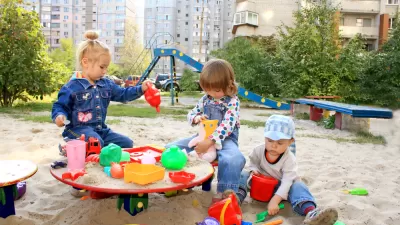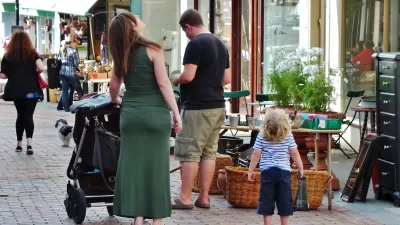According to Haya El Nasser, cities across America have succeeded in attracting young professionals for over a decade. “They came, they played, they stayed,” she writes. But, she asks, will these Millennials stick around as they age and have kids?
Richard Florida and Bill Fulton agree, Millennials not only move often, but they are also “the generation that decides where it's going to live before it decides what it's going to do.” This means that cities need to not only attract Millennials early on in adulthood, but also provide the amenities to keep them there in the long-term. Fulton asserts "capturing people early on in their lives in a metro really matters. It's important to compete with suburbs for people once they get a little older and have children." As Millennials age, cities will need to provide more than “hip entertainment venues and small flats," but also, “soccer fields, good schools and roomy homes,” Fulton says. "The question isn't so much getting families out of the suburbs into cities but getting them to stay in the cities."
According to Nasser, “The growing urban constituency of hipster parents is not timid about making itself heard," pointing out that "[e]ducated and in professional jobs, they are equipped to organize and galvanize.” Among other things, they demand safe neighborhoods, high quality schools, and larger 3-4 bedroom homes within cities, rather than in the suburbs. They also want access to other urban amenities near transit, which they are more likely to use, including grocery stores and childcare. Mayors, councilman and developers alike are responding to these demands in different ways: by endorsing school choice and charter schools, by investing in “quality of life” infrastructure and urban parks, and by building suburban housing environments in cities.
"We have professionals come and go, singles come and go," says downtown Los Angeles Councilman, Jose Huizar, "But you build for families, and they're here to stay." By building for families first with those amenities that also attract young adults, cities have much to gain. In doing so, they are fostering a stable tax base and continued economic activity as Millennials moves into family-hood.
FULL STORY: American cities to Millennials: Don't leave

Maui's Vacation Rental Debate Turns Ugly
Verbal attacks, misinformation campaigns and fistfights plague a high-stakes debate to convert thousands of vacation rentals into long-term housing.

Planetizen Federal Action Tracker
A weekly monitor of how Trump’s orders and actions are impacting planners and planning in America.

In Urban Planning, AI Prompting Could be the New Design Thinking
Creativity has long been key to great urban design. What if we see AI as our new creative partner?

King County Supportive Housing Program Offers Hope for Unhoused Residents
The county is taking a ‘Housing First’ approach that prioritizes getting people into housing, then offering wraparound supportive services.

Researchers Use AI to Get Clearer Picture of US Housing
Analysts are using artificial intelligence to supercharge their research by allowing them to comb through data faster. Though these AI tools can be error prone, they save time and housing researchers are optimistic about the future.

Making Shared Micromobility More Inclusive
Cities and shared mobility system operators can do more to include people with disabilities in planning and operations, per a new report.
Urban Design for Planners 1: Software Tools
This six-course series explores essential urban design concepts using open source software and equips planners with the tools they need to participate fully in the urban design process.
Planning for Universal Design
Learn the tools for implementing Universal Design in planning regulations.
planning NEXT
Appalachian Highlands Housing Partners
Mpact (founded as Rail~Volution)
City of Camden Redevelopment Agency
City of Astoria
City of Portland
City of Laramie





























